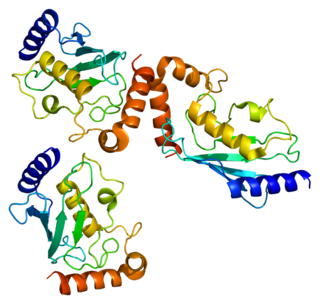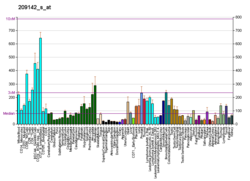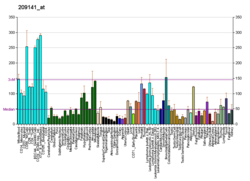
Ubiquitin-protein ligase E3A (UBE3A) also known as E6AP ubiquitin-protein ligase (E6AP) is an enzyme that in humans is encoded by the UBE3A gene. This enzyme is involved in targeting proteins for degradation within cells.
Ubiquitin-conjugating enzymes, also known as E2 enzymes and more rarely as ubiquitin-carrier enzymes, perform the second step in the ubiquitination reaction that targets a protein for degradation via the proteasome. The ubiquitination process covalently attaches ubiquitin, a short protein of 76 amino acids, to a lysine residue on the target protein. Once a protein has been tagged with one ubiquitin molecule, additional rounds of ubiquitination form a polyubiquitin chain that is recognized by the proteasome's 19S regulatory particle, triggering the ATP-dependent unfolding of the target protein that allows passage into the proteasome's 20S core particle, where proteases degrade the target into short peptide fragments for recycling by the cell.

Ubiquitin-conjugating enzyme E2 L3 (UBE2L3), also called UBCH7, is a protein that in humans is encoded by the UBE2L3 gene. As an E2 enzyme, UBE2L3 participates in ubiquitination to target proteins for degradation. The role of UBE2L3 in the ubiquitination of the NF-κB precursor implicated it in various major autoimmune diseases, including rheumatoid arthritis (RA), celiac disease, Crohn's disease (CD), and systemic lupus erythematosus.

CDC34 is a gene that in humans encodes the protein Ubiquitin-conjugating enzyme E2 R1. This protein is a member of the ubiquitin-conjugating enzyme family, which catalyzes the covalent attachment of ubiquitin to other proteins.

Ubiquitin-conjugating enzyme E2 D1 is a protein that in humans is encoded by the UBE2D1 gene.

Ubiquitin-conjugating enzyme E2 D2 is a protein that in humans is encoded by the UBE2D2 gene.

Ubiquitin-conjugating enzyme E2 D3 is a protein that in humans is encoded by the UBE2D3 gene.

Ubiquitin-conjugating enzyme E2 G2 is a protein that in humans is encoded by the UBE2G2 gene.

Ubiquitin-conjugating enzyme E2 variant 2 is a protein that in humans is encoded by the UBE2V2 gene. Ubiquitin-conjugating enzyme E2 variant proteins constitute a distinct subfamily within the E2 protein family.

Ubiquitin-conjugating enzyme E2 E3 is a protein that in humans is encoded by the UBE2E3 gene.

Ubiquitin/ISG15-conjugating enzyme E2 L6 is a protein that in humans is encoded by the UBE2L6 gene.

Ubiquitin-conjugating enzyme E2 C is a protein that in humans is encoded by the UBE2C gene.

Ubiquitin-conjugating enzyme E2 H is a protein that in humans is encoded by the UBE2H gene.

Ubiquitin-like modifier-activating enzyme 7 is a protein that in humans is encoded by the UBA7 gene.

Ubiquitin-conjugating enzyme E2 E1 is a protein that in humans is encoded by the UBE2E1 gene.

Ubiquitin-conjugating enzyme E2 J1 is a protein that in humans is encoded by the UBE2J1 gene.

Ubiquitin-conjugating enzyme E2 E2 is a protein that in humans is encoded by the UBE2E2 gene.

NEDD8-conjugating enzyme Ubc12 is a protein that in humans is encoded by the UBE2M gene.

Ubiquitin-conjugating enzyme E2 R2 is a protein that in humans is encoded by the UBE2R2 gene.

Ubiquitin conjugating enzyme E2 Z (UBE2Z), also known as UBA6-specific E2 enzyme 1 (USE1), is an enzyme that in humans is encoded by the UBE2Z gene on chromosome 17. It is ubiquitously expressed in many tissues and cell types. UBE2Z is an E2 ubiquitin conjugating enzyme and participates in the second step of protein ubiquitination during proteolysis. A genome-wide association study (GWAS) revealed the UBE2Z gene to be associated with chronic kidney disease. The UBE2Z gene also contains one of 27 SNPs associated with increased risk of coronary artery disease.


























